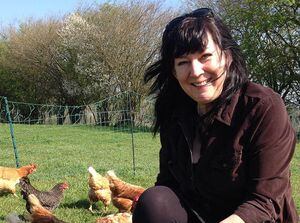Doctor: Farmer's anti-vegan claims are misguided - here's why
Dr Justine Butler, senior researcher & writer for Viva! Health, responds to a recent piece in the Shropshire Star opposing veganism.

Dr Justine Butler, senior researcher & writer for Viva! Health, responds to a recent piece in the Shropshire Star opposing veganism.
Retired livestock farmer Rosemary Allen’s column in the Shropshire Star was at best misguided.
Allen suggested it’s not true that going vegan is better for the planet and your health. Has she missed key research showing how going vegan reduces your food-related greenhouse gas emissions by as much as half? A finding shared by many studies including the substantive analysis from the University of Oxford scientist Joseph Poore. So convinced by the evidence was Poore, that he went vegan and said: “A vegan diet is probably the single biggest way to reduce your impact on planet Earth.”
It must be a healthy vegan diet if it’s to benefit your health – chips and beans won’t do. Allen uses pseudo-nutritional science to support her flawed argument saying: “when the world became vegetarian” (global meat production has never been higher) people missed out on vitamin D. This is nonsense. We make vitamin D in our skin in response to sunshine. In the UK, so many people, regardless of diet, fall short that the Government recommends everyone considers supplementing during winter. The NHS says: “In the UK, cow’s milk is generally not a good source of vitamin D because it is not fortified, as it is in some other countries.”
A vegan diet, Allen says, lacks vitamin B12. Vegans need to ensure a reliable source of B12, but as a livestock farmer, she must know meat and dairy contains B12 because farmed animals are given supplements! As for omega-3s and selenium et cetera, all major health bodies agree that a healthy, balanced vegan diet can provide all the nutrients you need and lowers the risk of obesity, heart disease, diabetes and certain cancers. One large UK study found that compared with meat-eaters, cancer incidence was 19 per cent lower in vegans. Similar results were found in the US.
Allen is also mistaken in saying that fishermen are sweeping the oceans for microalgae for vegan omega-3 supplements, depriving whales of food. Whales (and fish) eat krill, krill eat algae – which is why fish oil contains omega-3s. Krill are fished commercially for aquaculture and omega-3 supplements – but they’re not vegan. Microalgae (marine plants) could provide a sustainable vegan source of healthy omega-3s.
Allen says the recommended daily protein intake is 60 grams and suggests you could eat a portion of beef, two eggs, cheddar cheese and two cups of milk and not reach that target. Yet Public Health England’s nutritional database suggests that would add up to more than 60 grams. Her guidance contradicts the UK government’s recommendation that on average, men should eat 55 and women 45 grams daily. Too much animal protein contributes to health problems, such as kidney and liver disorders and increases the risk of cancer and heart disease.
Vegan foods provide plenty of healthy plant protein. Toast and peanut butter for breakfast, two vegan sausage rolls with a salad for lunch and vegan spaghetti bolognese for dinner adds up to 46 grams. Alternatively, muesli with soya milk and a banana, a falafel and hummus wrap and a tofu-stir-fry with seeds also adds up to 46 grams. Add drinks, soya milk and fruit and the final figure will be higher. Consume enough calories in a varied vegan diet and you’ll get all the protein you need.
Allen suggests soya phytoestrogens may promote the “growth of some cancer cells, impair female fertility and mess with thyroid function.” This appears to be a quote from Good Housekeeping magazine that goes on to say: “research in recent years suggests that moderate consumption of minimally processed soya foods… not only isn’t bad for you, it probably has some benefits.” They say soya may lower the risk of some cancers, could improve fertility, combat hot flushes and may protect heart health. World expert on soya, Dr Mark Messina’s excellent review confirms this and reassures on the safety of soya.
Lastly, Allen says Oatly adverts were banned due to misleading claims that meat and dairy emit more greenhouse gases than all the world’s transport. The United Nations’ Food and Agricultural Organisation says that livestock is responsible for 14.5 per cent of greenhouse gases and transport produces 14 per cent. The Advertising Standards Authority (ASA) found against them on a pedantic point that the transport figure doesn’t include vehicle production, just emissions!
The ASA did not find against Oatly’s claim that: “If everyone in the world adopted a vegan diet, it would reduce food’s annual greenhouse emissions by 49 per cent as Oatly provided evidence the ASA couldn’t argue with. This started with the claim that it’s not true that a vegan diet would benefit the planet and your health – evidence shows, it benefits both.





